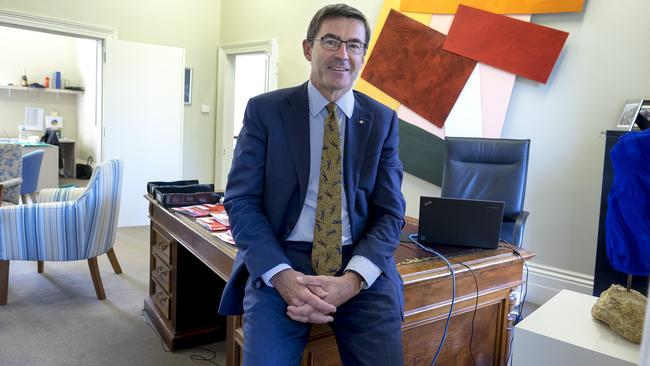John Wylie: Culture of caution ‘bad for nation’
Investment banking legend John Wylie fears a growing environment of distrust in boardrooms.

Investment banking legend-turned venture capitalist and philanthropist John Wylie fears a growing environment of distrust in boardrooms, where directors are too focused on “backside covering”, could be disastrous for Australia’s national interests.
Mr Wylie, who is one of the nation’s most senior investment bankers and chairman of the Australian Sports Commission, said he welcomed the cultural change in the financial services sector that had already flowed from the findings of the Hayne royal commission.
But he said there had to be better ways for non-executive directors to gain access to quality information about their companies and be held accountable to investors.
“In the corporate sector, I am not convinced that the Hayne royal commission is pushing business down the right path by placing so much emphasis on boards challenging management and seemingly shaming directors who are not seen to do this enough,’’ Mr Wylie told the Governance Institute of Australia’s national conference in Melbourne.
“Clearly there is a vital role for independent inquiry and challenge but it is not in the national interest for the environment in boardrooms, in the private sector and not-for-profits, to be one of suspicion and distrust between boards and management. And for directors to be focused on having backside-covering notes written into board minutes.”
His comments come after Commonwealth Bank chairwoman Catherine Livingstone was challenged before the royal commission on whether the bank had failed to meet its statutory obligations under the Corporations Act by not keeping accurate minutes from its board.
Commentators have since speculated that company secretaries may be required in the future to write board minutes recording the intimate details of conversations between directors that could stand up to the scrutiny of a royal commission.
AMP chairman David Murray has previously expressed concerns that directors are too often delving into the management issues of companies because of their significant board subcommittee commitments.
But Mr Wylie said it was still intensely difficult for non-executive directors to get access to the right information that allowed them to fulfil their responsibilities to shareholders.
“(The proceedings of the royal commission) show the tremendous difficulties for people who are fundamentally good people, well motivated, well intentioned, they work hard. But if you are a director of a bank and you get the board papers, they run to hundreds of pages,’’ he said.
“AMP, I know a lot of the people on the board there. They are good people, hard-working people, ethical people, and they had 19 committees and subcommittees of the board … Yet you don’t know sometimes what is going on in such a large and fast-moving organisation.”
He said there was no excuse for some of the behaviours within the banks and other financial services companies that had been on display at the royal commission.
“The boards of those organisations are deeply embarrassed. (But) the fact is they didn’t have the systems where they were able to know what was going on at the coalface. How do you find that stuff out?’’ he asked.
“There has to be a revolution in the way that information is provided to non-executive directors in a way that addresses this information deficiency that NEDS have. Because at the moment it is pretty tough.”
Mr Wylie said one of the most important outcomes from the royal commission would be that organisations generally, not just in the financial services sector, would realise “it is an existential threat to their business if they don’t put the customer first”.
But he echoed the recent concerns of Wesfarmers chief executive Rob Scott and KPMG Australasia chairman Alison Kitchen — who is a member of KPMG’s global and regional boards — that the fallout from the royal commission could deter risk-taking by directors.
“I do hope it doesn’t feed a climate in Australia of excessive focus on risk aversion in a controlled governance monitoring situation. It is also in the national interest that our companies take risks to grow. We are trying to grow the economy,’’ he said.
“It is in that national interest that Australian companies are pro-growth and take a risk and that they don’t get the living daylights beaten out of them when things go wrong, because they sometimes will go wrong.”
Ms Kitchen has said it was harder for boards to take calculated risks in an environment where even companies that had delivered good shareholder returns and admitted to making mistakes were being punished.
“You have to say there are lots of companies where there is increased tension between board and management and lots where it is really hard — whether you are boards or management — to take the bold decisions and take risks,” she said.
In addition to chairing the sports commission, Mr Wylie is involved in running his family office, Tanarra Capital, and has established Tanarra Philanthropic Advisors to provide business-like analysis for charities.




To join the conversation, please log in. Don't have an account? Register
Join the conversation, you are commenting as Logout